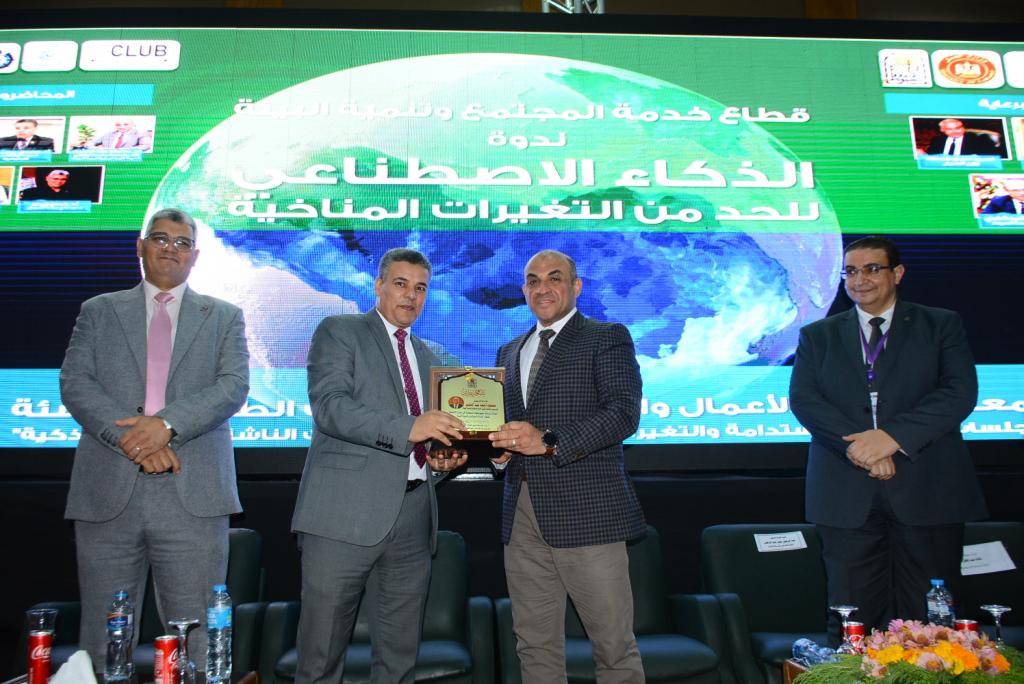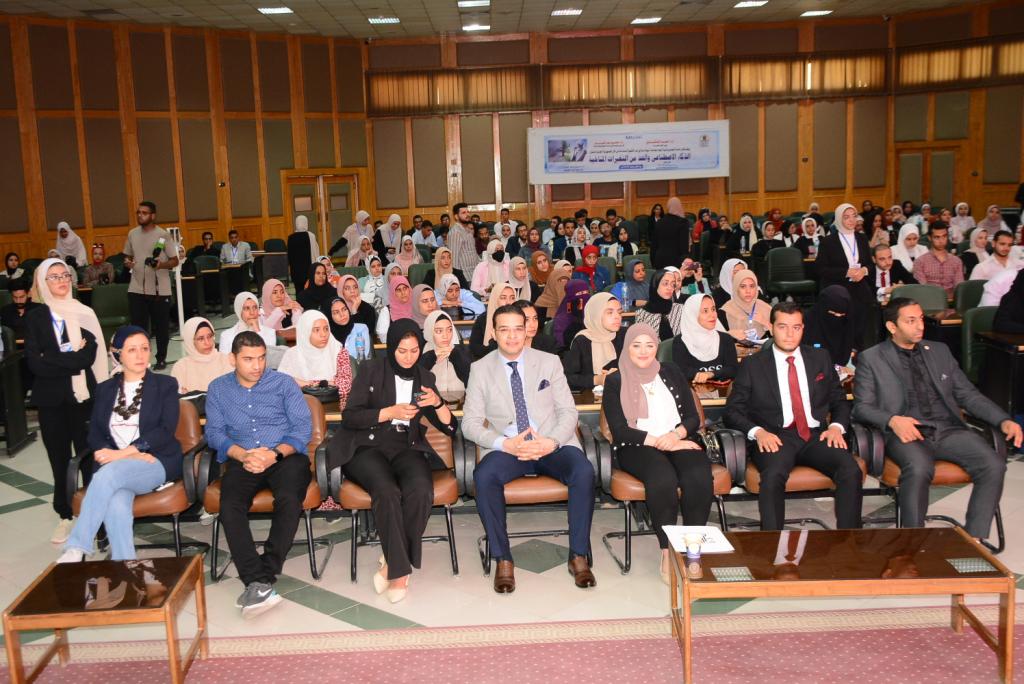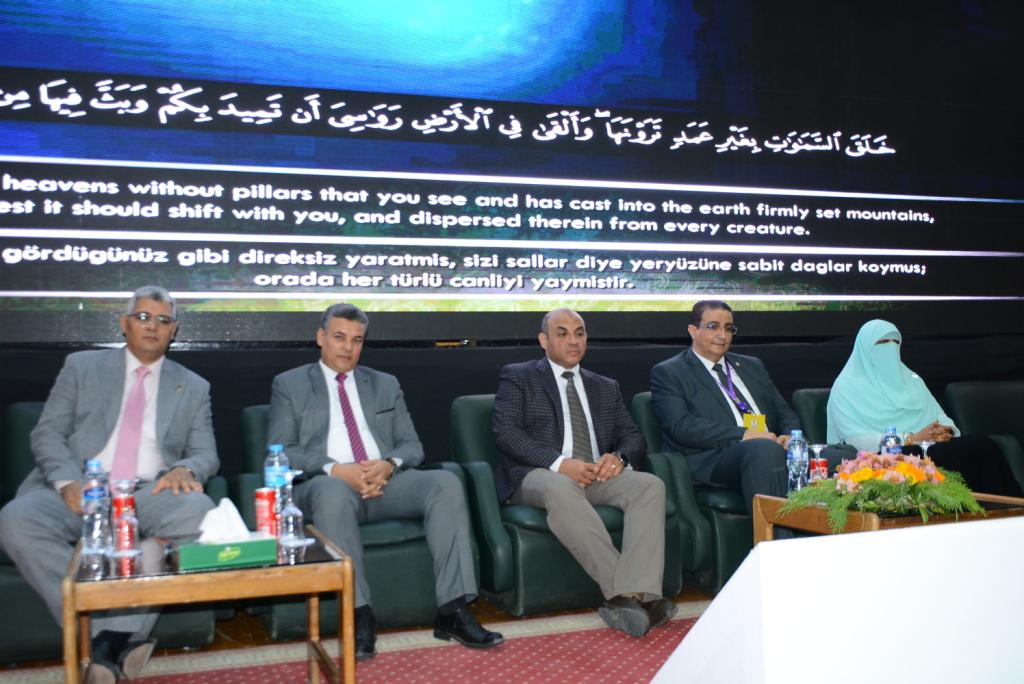Today, Monday, the 24th of July, Assuit University organized an educational and awareness-raising symposium on “Artificial Intelligence and the Reduction of Climate Change” under the auspices of Prof. Ahmed Al-Menshawi, President of the University and under the supervision of Prof. Mahmoud Abdel Alim, University Vice-President for Community Service and Environmental Development in the context of the events of the Entrepreneurship, Employment and Student Start-up Companies Camp. The symposium was organized by the Community Service and Environmental Development Sector in collaboration with the Faculty of Social Work and the Entrepreneurship Club within the framework of the University’s developmental and awareness-raising role in confronting negative phenomena.
Prof. Ahmed Al-Menshawi emphasized the importance of conducting projects within the framework of artificial intelligence applications to confront the climate change phenomenon, measure environmental pollution and enhance the role of scientific research to provide proper suggestions and solutions in order to confront the hazards of climate change and raise community awareness of the hazards of climate change to the environment.
The symposium discusses the most important future challenges in the field of artificial intelligence, its impact on climate and humans, and the impact of modern discoveries on the community and environment. It also highlighted the role of artificial intelligence in reducing climate change and understanding the relation between the development of political and historical studies and artificial intelligence.
In this context, Prof. Mahmoud Abdel Alim delivered a lecture entitled “sustainable development”, its concept and the four stages of industrial revolution which include: steam, electricity, silicon, and the alliance of major sciences such as physics, biology and digitalization. He also presented the goals of sustainable development in its new version of Egypt’s vision of 2030 which includes knowledge, creativity, strong economy, justice, integration, quality of life, leadership, peace, security, governance and environmental sustainability. He added that the State is able to increase the social, natural, economic and human resources to provide multiple community integration, achieve social justice, preserve environmental safety and satisfy the main human needs.
Prof. Saudi Hassan spoke about environmental citizenship, its role in reducing the protection of local and global environment and its natural resources from pollution as well as the active participation of citizens in moving towards environmental sustainability. He illustrated the environmental citizenship dimensions of knowledge, participation, environmental behavior, skills and values along with the mechanisms for incorporating environmental citizenship among university students to enhance environmental awareness, conduct more scientific research, correct the environmental concepts prevalent among the youths, survey the various cases of environmental pollution and hold training courses and workshops to develop awareness of environmental hazards.
Dr. Abdel-Rahman Hedar referred to the use of artificial intelligence applications to reduce climate changes such as forecasting, accountability, recycling and energy. He also explained how artificial intelligence can be used to reduce climate changes such as reducing greenhouse gas emissions, how to adapt to and mitigate the impact of climate change, how to use and maintain natural resources, and how to develop new methods to monitor and measure environmental phenomena. He also gave an overview of the most important future trends and opportunities for artificial intelligence in climate change.
In this respect, Dr. Hamdy Zidan spoke about renewable energy and the reduction of climate changes such as solar and wind power plants which are considered one of the largest fields in Egypt as well as wave and geothermal energy such as producing natural gas from garbage through burial.
In a related context, Dr. Ghada Abdel Aal explained the concept of climate change and its impact on earth such as the phenomena of natural global warming and thermal islands. She added that the causes of climate changes include human factors such as burning fossil fuel, deforestation, increased pollution, excessive use of chemical pesticides and fertilizers and increased industrial activities. Natural factors, on the other hand, include population explosions. She also gave an overview of Egypt’s efforts to confront climate change which include increasing the use of sustainable transport, clean energy, desalination of sea water, recycling fresh water, and spreading awareness.
Mr. Sameh Gomaa expressed his delight to participate in this distinguished event that would provide job opportunities for the youths, support their experiences and activities, achieve their ambitions and goals, benefit them with the crucial guidelines that will be offered by the lecturers in the field of entrepreneurship and inform participants of the types of intellectual property rights such as patent, copyright, trademarks and author’s rights.
The events of the symposium witnessed the honoring of Prof. Mahmoud Abdel Alim, University Vice-President for Community Service and Environmental Development; Prof. Saudi Hassan, Dean of the Faculty of Social Work; Prof. Abdel Rahman Heider, advisor of the University president for information technology and artificial intelligence, and general supervisor of the Entrepreneurship Club; Dr. Hamdy Zidan, manager of the Entrepreneurship Club and Integrated Technology Transfer Unit; Dr. Ghada Abdel-Aal, assistant professor at the Faculty of Social Work and reporter of the symposium; and Mr. Sameh Gomaa, legal advisor for their distinguished and active participation in this symposium.


 Do you have any questions?
Do you have any questions? 





